

Thoughts on the Ray Peat Diet- A Review


Disclaimer: This is my opinion based on preliminary research of Ray Peat’s body of work and my clients’ experience in a clinical setting on thyroid, hormone, and endocrine health. This is not to disrespect Ray Peat, the person. I have not read even a fraction of the research and writing he has done and to that, I can say that my opinions may not correctly depict his point of view. Regardless, my stance on fructose is well-researched and I will attempt to share additional information than what is depicted in Carnivore Cure.
—
I completed the first manuscript of Carnivore Cure in 2019 and for most of 2020, I have been working on Carnivore Cure graphics and manuscript edits. And then the pandemic happened. I decided to stay off social media for many reasons, but one reason was that I saw one too many influencers and leaders all of a sudden turning their back on a meat-only diet—maybe because so many of the community were too.
It’s never easy to swim upstream.
It’s very normal during a highly stressful state to crave sugar and carbohydrates. We were in an unprecedented time and we were running out of meat and toilet paper, and we frankly feared our lives: our jobs, our health, and our loved ones with immunocompromised health. The pandemic had come, and no one knew what the imminent future held. What we did know was that the world had shut down because of it. So most families stocked up on foods, even junk foods, to survive.
Who knew when we’d go out again?
Our lives completely stopped and we were stuck at home with extra stockpiles of food. Whether it’s the high cortisol rush from stress (remember, your body can’t tell the difference between acute stress from the need to run from a bear or chronic stress from the thoughts in your mind, but nonetheless, your body dumps out cortisol, thinking you need to run so you can survive another day).
But instead of running, our body was in a mentally stressed state, just eating and sitting at home. And we ate until we gained all the pandemic pounds. We rationalized our new ways by saying we don’t belong to a particular diet and that a diet will no longer define us. And if someone disagreed, they were canceled. Or worse yet, they were labeled dogmatic.
This is cancel culture at its finest. We don’t want to hear opposing sides because we are right and that’s that. Love it or leave it. And if you counter, well then you are a dogmatic zealot for your said diet.
Controversial PUFAs
I started seeing recommendations to stop eating polyunsaturated fatty acids (PUFAs) because of possible weight gain. Conventional (market) chicken and pork should be limited because it will make us gain weight because the signaling of PUFAs tells the body to store more fat. This thought process also includes fish. Fish also contains a significant amount of PUFAs. And so they argue that with the concerns of sourcing, we should stop eating all of it, especially rancid fish oils.
I also started seeing that we needed vegetables, especially raw carrots, daily for hormone health. If we want proper thyroid function, we must eat vegetables.
At the time, I thought people had just gone rogue. I never realized all this work was parroting Ray Peat (though some of the PUFA ideas are from others like Michael Eades). And while I initially jumped on the “this is crazy” bandwagon, I also chose not to be ignorant or live in an echo chamber.
The Ray Peat Diet
So I did my homework and spent some time researching the beliefs and practices of Ray Peat.
There is no real Ray Peat diet. Ray Peat has beliefs about nutrition and cellular energy and shares his musings in writing and talks. From his large body of work, avid fans have essentially made a list of foods that make the Ray Peat diet. Since there is no definitive list, his avid followers can easily remove some foods and selectively pick and choose from his teachings.
Fair enough. (Bulletproof excuse but fair enough).
But since this is about Ray Peat, I will talk through some of his beliefs and why I disagree.
Ray Peat’s dietary recommendations are essentially rooted in supporting cellular energy production. He focuses on the connection between nutrition and how it directly impacts aging and hormones.
So as I talked about, PUFAs negatively impact cellular energy and make us fat by signaling the body to store more fat. (to make it very simplistic).
Ray Peat’s Dietary Beliefs
His diet believes in healthy fats (butter, coconut oil, and lots of dairy), moderate protein (dairy, muscle meats, liver, collagen, and eggs), carbohydrates (tropical fruits, fresh fruit juice, root vegetables, and tubers, especially raw carrots daily and potatoes), coffee, and moderate use of white sugar. He’s a big fan of ice cream with real ingredients, given the items above.
He believes in strict avoidance of all PUFAs, including conventional chicken, pork, and fish (fish oils).
From recordings, his diet includes drinking quarts of milk and orange juice, pints of ice cream, Mexican Coke (because it has real cane sugar), gelatin, and other foods listed above.


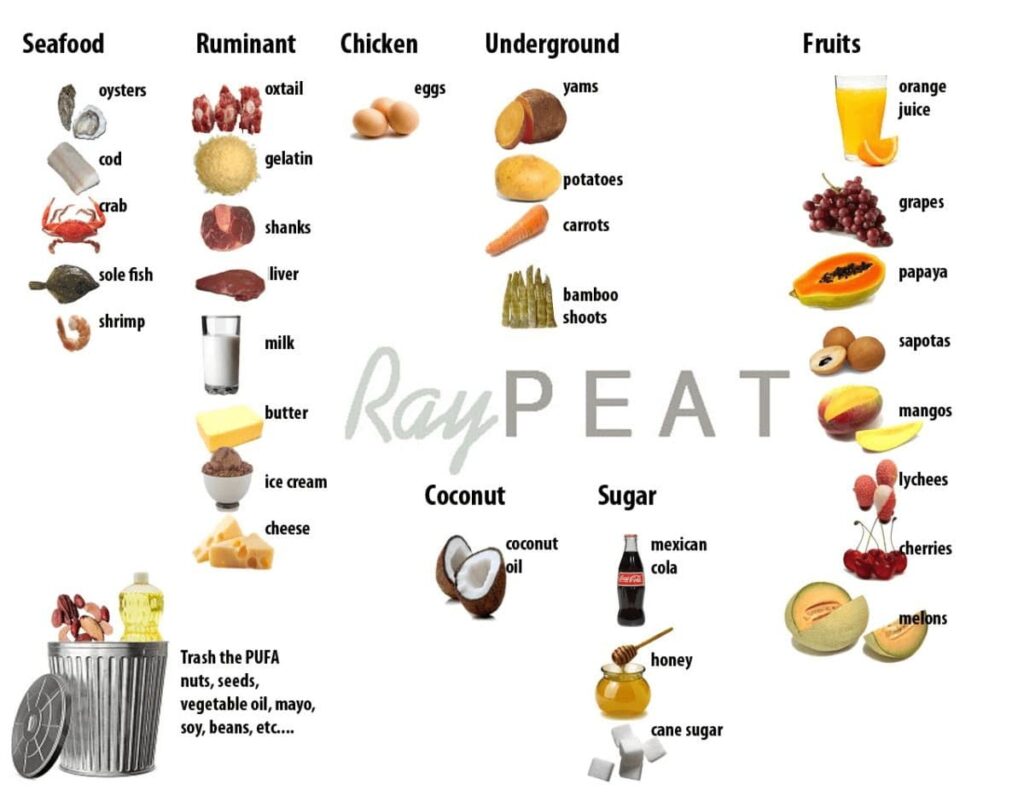

Apparently, Mexican Coke no longer has sucrose. One study showed a lab analysis of the coveted Mexican cola and it was the same makeup as high fructose corn syrup. Additionally in 2013, the Mexican government started taxing sugar to fight the obesity epidemic. So just like in the U.S., Mexican soda manufacturers started using high fructose corn syrup for almost all sodas. And high fructose corn syrup will only worsen the obesity epidemic.
You can watch more about the false advertising of Mexican cola, here.
Energy Source and Cellular Energy
Replenishing glucose with carbohydrates can be more efficient than gluconeogenesis from protein (your body has mechanisms to convert fat and protein into glucose/glycogen for energy).
But this replenishment of glucose is an over-exaggeration. Glycogen (the stored form of glucose) is mainly stored in the liver and the muscles. It doesn’t require a lot of sugar to fill these stores. That’s why even as sugar-burners for decades, we can produce ketones (energy from fat) in a matter of two days.
As a fat burner, you’ll mainly use glycogen during strenuous workouts. If you eat organ meat and shellfish, those meats also contain carbohydrates. If you are zero carbs, your body will need to use gluconeogenesis for parts of the body that require glucose (it’s minimal).
But this isn’t the whole story.
The brain is the most energy-demanding organ in the body and requires fat for survival. If we recall a little bit of biology, the powerhouse of cells is the mitochondria. The mitochondria convert what we eat into energy.
Our brains need fat-soluble vitamins and cholesterol for cognitive function, memory, and proper nerve function. Most of us fuel our brains with glucose from carbohydrates but the long-term effects of carbohydrates for energy are damaging to our bodies. Too much glucose is not good for anyone. One reason is that both the heart and brain prefer fat as their fuel source. In fact, all cells require fat for proper structure and functioning.
So if we are sugar burners, what does that do to our heart and brain, which prefer fat as a fuel source? Could this be a cause of Alzheimer’s? After all, they are starting to call Alzheimer’s, Type 3 diabetes.
We know by now that if we are sugar burners, all the fat we consume mostly gets stored as fat. The body rarely accesses the fat and whatever glucose we don’t use up, also gets stored as fat. And since energy from sugar is easier to make than requiring the body to make ketones, your brain will tell you to get more sugar when you are having the insulin dip of energy.
So you eat. You get a burst of energy for a short bit, but you rarely access the fat stores for sustained energy, and over time, that’s how you pack on the pounds and always feel hungry. And the worst case, you eat your sugary way into metabolic disease.
Let’s Do Some Math on Ray Peat’s Diet
- 1 Pint of Organic Vanilla Ice Cream: 760 calories, 76 grams of carbohydrates, 14 grams of fat
- 12 fl oz. of Mexican Coke: 150 calories, 39 grams of carbs, 0 grams of fat
- 1 quart of fresh Orange Juice: (4 cups): 392 calories, 88 grams of carbs, 0 grams of fat
- 1 medium banana: 105 calories, 27 grams of carbs, 0 grams of fat
- 1 medium mango: 144 calories, 38 grams of carbs, 0 grams of fat
- 1 medium orange: 47 calories, 12 grams of carbs, 0 grams of fat
- 1 medium papaya: 120 calories, 30 grams of carbs, 0 grams of fat
Just adding up the first three items makes this diet nearly 200 grams of carbohydrates. Sorry, but you will not be accessing your fat stores. Using a high carbohydrate diet with high fat is a hazardous diet.
- You are inundating your liver with way too much glucose and fructose. Learn more about fatty liver concerns here.
- And this doesn’t even consider the risk of cardiovascular disease with all the circulating triglycerides (from carbs).
- If you eat this way, make sure you are metabolically healthy and that you are cycling between sugar-burning and fat-burning. Otherwise, you will only be using the sugar as energy and storing away most of the good fats you are consuming. One way to check this is by checking your ketones occasionally. If you never register ketones, I’d be concerned if you are eating lots of carbohydrates (>200 grams daily) while also eating a high-fat diet (eating ribeye would be considered high-fat in this context).
Table sugar is made of two molecules: glucose and fructose. Our entire body can use glucose. Excess glucose is stored in the liver and muscles, and then any excess is stored as fat. But fructose bypasses all of this and is absorbed a bit by the intestines but mostly absorbed by the liver alone. The problem is that the liver is only about 5 pounds. Fruits are pretty much half fructose and half glucose. If you have non-alcoholic liver disease, it’s because of one too many carbohydrates.
I’ll come back to the risks of too much fructose.


I talk about this in Carnivore Cure, but our blood sugar is considered normal in the range of 80 mg/dL.
“The human body contains about five liters of blood at any given time. Its blood sugar range is carefully controlled at around 80 mg per deciliter (mg/dL). Mathematically, this works out to about 4 grams of sugar, which is less than a teaspoon. Someone who is prediabetic has glucose levels of about 100 mg/dL, about one teaspoon of sugar circulating in the blood. People diagnosed as diabetic have a fasting blood sugar level of more than 120 mg/dL; the amount of sugar in the blood is about 1.25 teaspoons. This demonstrates that the amount of sugar in the blood is carefully regulated: the difference between being healthy and being diabetic is only a quarter teaspoon of sugar (see Table 4.7). When someone consumes too much sugar, their body goes into an emergency state. It has to prioritize shoveling away sugar in the bloodstream. The body prioritizes life or death matters and focuses on clearing excess sugar from the blood, so it uses up essential nutrients to produce insulin to clear glucose from the blood and fructose from the liver.” (Carnivore Cure)
So if our blood sugar has about 4 grams of sugar at any given time, how do the foods listed above impact the blood? Even drinking one Mexican Coke is 39 grams of carbohydrates. That’s nearly 10 times the range that’s considered normal for the blood. Imagine what your body has to do to remove the excess sugar in the blood. And then imagine doing that every single day for multiple meals and multiple snacks a day. That can’t be good.
And this doesn’t even consider the additional nutrients needed. Everything that occurs in the body requires nutrients. If your body is consuming that much sugar, your body needs extra nutrients to support liver health and insulin production. Yes, it requires nutrients to make insulin.
And what happens to all that saturated fat you eat with this amount of sugar? And by the way, coconut oil (the medium-chain fatty acids) is damaging to the gut. Yes, it’s controversial, but coconut oil is not good for gut health. I have a YouTube video with Kiran Krishnan, a well-known biologist and we talk about the details with coconut oils.
Even if there is truth to PUFAs, causing us to store more fat, or being toxic to the body, the amounts in grocery store chicken, pork, and fish aren’t the reason for obesity. These PUFAs don’t move the needle so much to even hyper-focus on, especially in the context of a meat-based diet. Toxic, inflammatory seed oils like canola and soybean oil are a different story.
If you have diabetes, blood sugar imbalances, or even cortisol imbalances, this is not a diet that will be ideal for you.
This diet is very similar to some that follow a paleo diet (at least the real fruit part). Are all paleo dieters free of thyroid disease?
Update, More on PUFAs: Omega-3 and Omega-6
I went down some very deep rabbit holes researching polyunsaturated fatty acids. I wrote an entire thought piece on the notion that omega-6 fats are toxic to the human body.
Here’s an excerpt:
Every cell of the body needs fats. The structure of every cell in the body is made from fatty acids and these structures control everything. When you don’t have the proper fats, you don’t have proper cells and when you don’t have the proper cells, you don’t have proper function.
 There have been discussions that seed oils and vegetables are toxic because of their polyunsaturated fatty acid (PUFAs) composition.
There have been discussions that seed oils and vegetables are toxic because of their polyunsaturated fatty acid (PUFAs) composition.
Some studies mentioned in the article:
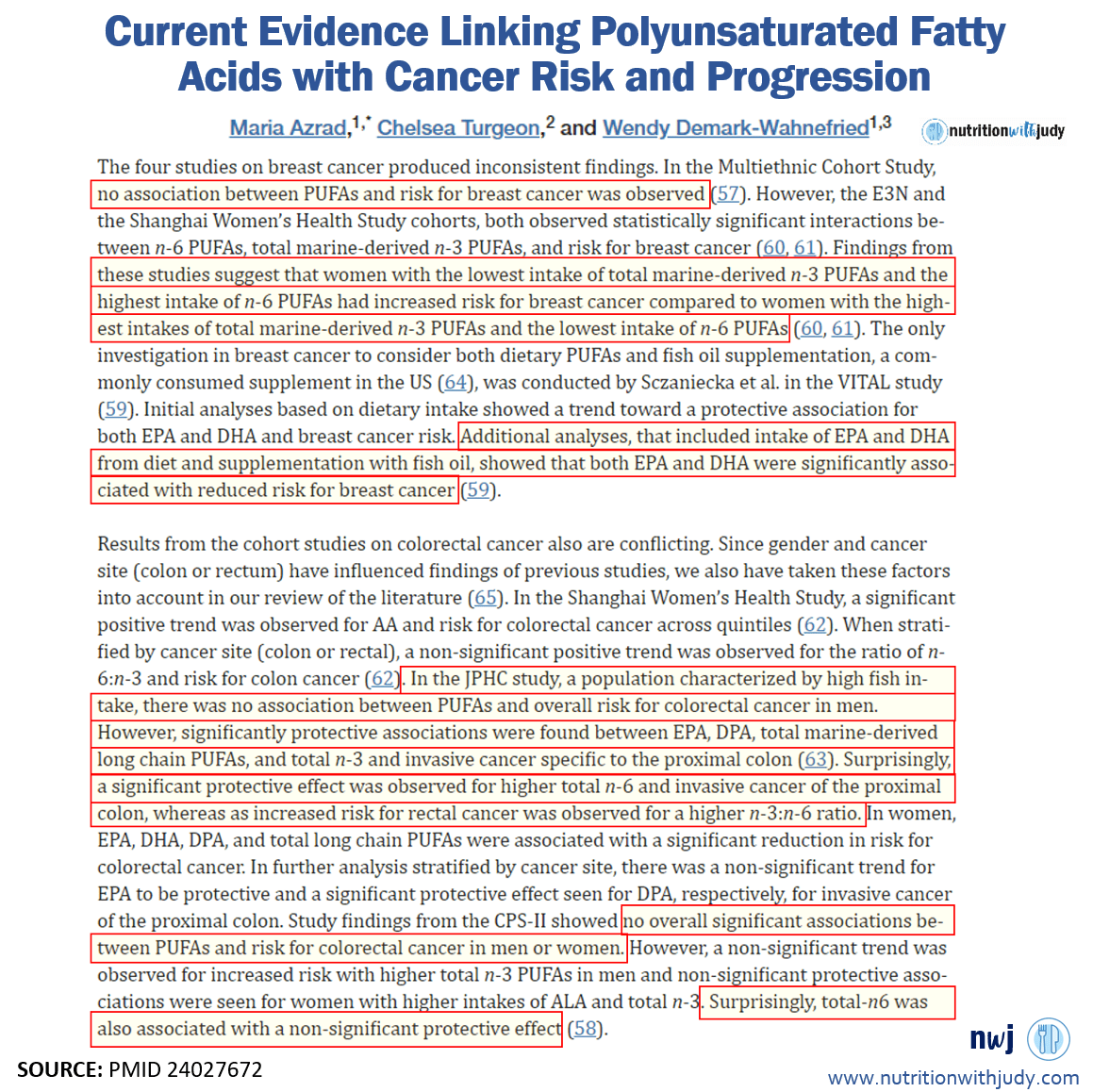



And a fun fact, all blue zones, eat one meat in common: pork
Randle Cycle
One additional concern with the Ray Peat diet is the Randle Cycle at play.
“Randle demonstrated that impairment of glucose metabolism by fatty acid (or ketone body) oxidation was mediated by a short-term inhibition of several glycolytic steps, namely glucose transport and phosphorylation, 6-phosphofructo-1-kinase (PFK-1), and PDH.” (Source)
To make it overly simple, if you eat glucose, it impairs fatty acid metabolism and if you eat fats, you impair glucose metabolism. Then what happens when you mix both energy sources consistently? Hello, Standard American Diet.
You essentially metabolize no fuel source well, causing your cells to be less than ideal. Ray Peat’s diet uses foods rich in both glucose/fructose and fats.
In one YouTube video, Bart Kay, a nutritional scientist, did a great job explaining the Randle Cycle.
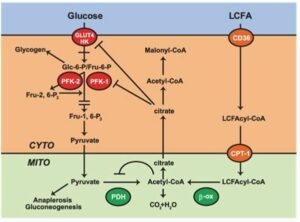

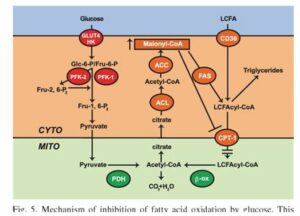

Uric Acid, Purines, and Fructose
Uric acid has been shown to adversely impact metabolic health. Purines are produced from DNA breakdown and fructose is from all fructose foods (and glucose that gets converted to fructose via the polyol pathway).
If you struggle with hyperuricemia, I recommend checking out my uric acid decision tree and watching or listening to the very insightful discussion I had with Dr. Richard Johsnon about the risk of eating a meat-based diet with added fruits, honey, and liver.
A diet rich in meats, organs, fruits, and honey puts you at risk for metabolic syndrome.
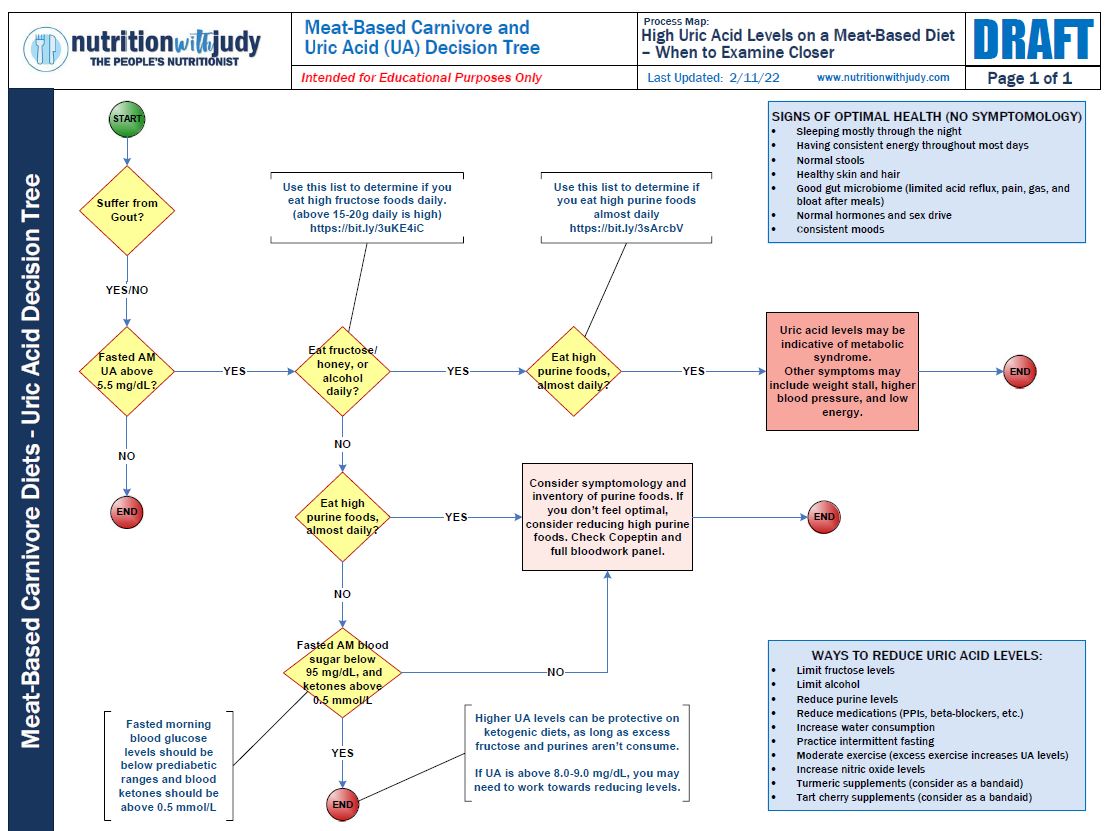
Vitamin E Utilization of PUFAs
I’m not going to get into too much detail here about vitamin E but just know that all fat-soluble vitamins work together. If you supplement just one and not the others, you are playing God in a game that you don’t know all the rules. Yes, even vitamin D can be the same case. I cite varying studies in the Carnivore Cure and how there is no definitive answer to supplementing fat-soluble vitamins. So, if you are giving up PUFAs and supplementing with vitamin E, I’d throw caution.
We just don’t know enough, and most of the fat-soluble vitamins are hormones. So you are also playing God with hormones. It’s just not ideal.
Let the body find its balance.
Dairy
Not everyone can tolerate dairy, especially pasteurized dairy. Many diets remove dairy because it can be insulinogenic and cause weight gain. It also impacts the immune system for many and causes gut imbalances. Raw milk is different, and organic pasteurized milk is not the same as raw milk. You can read more here.
Thyroid and Endocrine System
There was a European study with nearly 300 hypothyroid patients with ambiguous hypothyroid diagnoses. They were all on hypothyroid medications. The doctor took them off medications and found that 60% were misdiagnosed. Sixty. They were not hypothyroid. They had no thyroid disease.
Just because your markers are low, is it truly hypothyroidism? Or if one number of the thyroid panel is out of range, do you have a thyroid disease? Lately, everyone is or knows someone who has thyroid dysfunction. It’s becoming a prevalent disease to label.
But is it the thyroid?
The thyroid is part of the endocrine system (thyroid, adrenals, hormones, pituitary, hypothalamus, etc.) If you see the Carnivore Cure graphic below, you can see that the causes of endocrine disruption start with multiple factors. Stress (even blood sugar imbalance), toxins (environmental), poor diet, poor digestion, minerals, essential fatty acid deficiency (FISH!), and dehydration. These collective reasons then start to show dysfunction in the waterfall cascade.
We first see the breakdown of blood sugar imbalances. We may feel tired after meals or start having prediabetic numbers. The next function to then suffer is the adrenals. Remember, when we are chronically stressed, the adrenals pump out cortisol to manage stress. But the adrenals also pump out cortisol to manage excessive blood sugar imbalances. (why also we wake up in the middle of the night). Excessive workouts can also increase cortisol.


Downstream, you finally see dysfunction in the thyroid and sex hormones. It’s easy to notice issues with sex hormones. You lose your period or you no longer ovulate. Your thyroid is easy too. Your T3 might be low and your TSH might be high. Or you might feel very low energy.
But based on this graphic, how do you know what caused the sex hormone dysfunction? Or thyroid dysfunction? What if it’s blood sugar? If it is an issue of blood sugar and adrenals, do you think eating excess fruit will help?
Could a meat-based diet now reveal underlying issues you’ve been having because you are no longer eating carbs? Maybe going zero carbs is a step closer to revealing root cause issues and not the actual issue.
What if you start taking thyroid medication or sex hormones, but the root cause issue is something upstream? Are you just adding fuel to the fire?
See the graphic below for an example.


Take a look at the highlighted blue boxes. You can take Progesterone or Pregnenolone exogenous hormone creams or medications, hoping to help your sex hormones. But instead of making the sex hormones, like Pregnenolone going down to make Estradiol, these exogenous hormones get routed to make more cortisol. What is the root cause reason you are low in sex hormones? You might be deficient in sex hormones because of poor nutrition and high stress, causing cortisol to steal all the nutrients from the sex hormones.
We need to balance blood sugar to survive another day. We don’t need to make babies to survive another day. The same goes with thyroid health. You can survive another day even if you are losing your hair and cold all day.
Root cause healing would be to cut down stress or reduce sugars. But instead, by plugging in hormones and playing God, we risk making even more cortisol in the body. And you don’t want chronically elevated cortisol (see below).
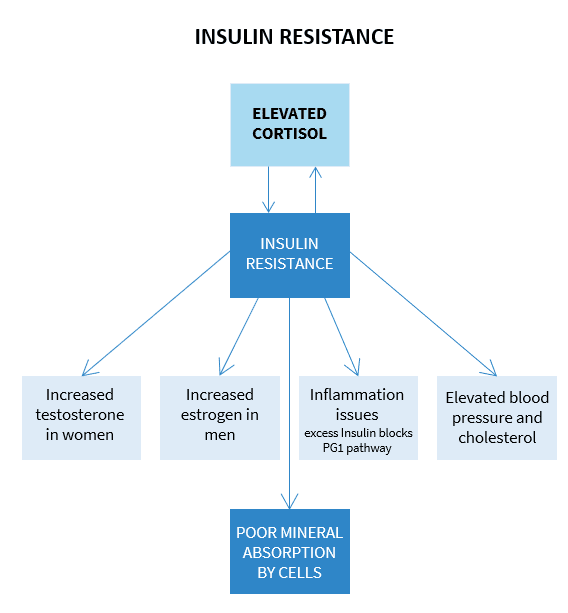

The same can be said for thyroid medications. If you have been diagnosed with hypothyroidism and no thyroid medication has helped your symptoms, I’d get another opinion from another doctor. It might be some other root cause issue that is showing up as a thyroid health imbalance.
Thyroid < Gut Health
Gut health has a direct impact on thyroid health. Most hypothyroid sufferers have Hashimoto’s, which is an autoimmune disease. 70-80% of our immune health is in our gut (small intestine, specifically). By supporting our gut, we reduce autoimmune symptoms and often improve our thyroid health. The small intestine is also where we absorb our nutrients. With poor gut health, we need to take more thyroid medication (T3) even to get the amount we may need to raise the numbers.
Twenty percent of thyroid function depends on a sufficient supply of healthy bacteria to convert T4 to T3. Yes, gut infections are a significant cause of thyroid issues, including low T3, as a lot of T4 is converted in the gut. Candida can also cause thyroid issues.
Do you know what can exacerbate candida?
Oxalate consumption.
Do you know what’s high in oxalates?
Carrots. (Carrot section below).
If you ever suffer from leaky gut, SIBO, SIFO, or IBS, you probably don’t want to consume all those carbohydrates. Did you know that the gas in our gut is not from the human body? We consume carbohydrates, and the bacteria in our body ferment carbohydrates to make gas (methane, hydrogen, sulfur, etc). The more bloating and pain you feel after eating, the higher the likelihood you have these gut issues. Meat alone usually won’t heal these diseases either (I’m not talking about simple bloat, gas, and digestive issues). You need to work with a practitioner to heal severe gut disease.
And eating carbohydrates that feed these bacteria will only make things worse—ever heard of the FODMAP diet that still includes some plant-based foods but is used for gut disease? Well, the goal of the diet is to cut fruits and vegetables that feed these bacteria. Since it doesn’t remove all plant-based foods, it doesn’t remove all the culprits. And yes, a lot of these plant-based foods that Ray Peat recommends are on the “do not eat” list.
If you are suffering from thyroid issues, I suggest checking your gut health first.
Let me give you an example to bring it all together.


Let’s look at this symptom burden graph that I use with all my nutritional therapy clients. I was plant-based for 12 years, and you can tell (pink line) that I had significant issues with sugar handling and overtaxing my adrenals. At this point, I was not doing any fasting and was healing from the carbohydrates I consumed for years. I was waking up several times a night to pee (or so I thought).
But also noticed that my gut needed support, especially my Upper GI (that means stomach). So I took some gut-healing supplements, and continued to eat zero carbs, and by September 2018, I was healing. My symptoms were nearly zero and I was sleeping through the night. (still do) Yes, I was feeling great.
If you see the graphic, everything to the left of Sugar Handling is considered a Foundation or Root Cause in nutritional therapy. Everything to the right of Sugar Handling is consequences, meaning because something is broken on the left, something on the right is suffering. Maybe my Adrenals are off-balance because my Sugar Handling needs support. Or maybe my Small Intestine is not in good shape, so I’m not absorbing nutrients and have the Vitamins Need.
So, where does this leave us with thyroid and female and male reproductive health? They all are on the right side as Consequences. Should we be focusing on those first?
Fish Oils
If you see the symptom burden graph, I also needed fatty acid support, especially since they are part of the Foundations. Fatty acids are primarily because of omega-3 fats. When Ray Peat says to limit fish and no fish oils, I throw strong caution at this.
I’ve seen some commentary that fish oils are rancid because PUFAs are delicate fats. This is so far from the truth. Yes, PUFAs are delicate fats. But they are not in that form in fish oil supplements. There are some cheap fish oils (and rancid) out there. But depending on the fish oil, they are either sold in the triglyceride or ethyl ester form. Sorry, but when someone says not to consume fish oils because they are unstable fats, it’s just not the full story.
I’ve done my research and contacted both companies I work with for fish oils. Both of them use the triglyceride version and test for rancidity. I stand by these fish oils that my entire family takes them (yes, even my four-year-old son).
Stay away from ethyl ester forms. They’re man-made. These supplements have a higher chance of being rancid. If your fish oil price is on the lower end, it’s probably a good chance you’re buying the ethyl ester form.
Stick to wild salmon, wild sardines, and fresh oysters. But if you can’t tolerate seafood, quality fish oils do have a place in healing.
We need fat and not just saturated fats. Fats are the outermost layer of every single cell in the body. Hormones are made from fat, especially steroid hormones (cortisol). Most of my clients are fatty acid deficient. Fatty acid deficiency can show up as dry skin and muscle fatigue.
We need to consume a variety of high-quality fats and let the body take care of the rest. Learn more about the importance of omega-3s such as DHA in the diet here.
My Thyroid Health
Per my symptom burden graph, I was feeling great, but my bloodwork showed differently for thyroid health.
In April-June of 2018, I went to get some bloodwork done. My A1C was looking better, hs-CRP (for inflammation and risk of heart disease) was low, and insulin was low, but so were my thyroid markers. But since only my T3 was low, my doctor decided to wait and see, instead of putting me on any medication.
I have not had any issues with hair loss, eyebrow hair loss, and low energy. Additionally, I am still nursing my four-year-old son and since I got my period back (after pregnancy and exclusive breastfeeding), I get my period consistently every month.


Some doctors would have put me on medication but I felt fine. And as I healed my gut and took some temporary healing supplements, I felt even better.
I no longer take most supplements but my T3 is still low. And I don’t plan on taking any medication.
What does this mean?
Well, in the book and in this YouTube video, I talk with Dr. Jaime Seeman about how we have T3 in our peripheral tissues that cannot be detected with bloodwork. So maybe I have sufficient T3 levels and this is the new norm for carnivores.
We don’t trust the dietary guidance of grains and other foods. But why do we trust these governing bodies for their recommended ranges for bloodwork? Maybe these ranges are also non-applicable for a meat-based diet.
Cholesterol
While I’m sharing my bloodwork, I’ll throw in a tangent and share my lipid panel.
Here is my bloodwork while I was plant-based. The doctors always told me it was beautiful. Well, I was also suffering from an eating disorder and struggling with depression. I was on antidepressants during some of these times too.


Since going meat-based, my lipid panel is out of range. But my CHD risk is low. And reference the hsCRP (C-Reactive Protein) marker above as well.


You can also see that with HDL increasing, the risk of high LDL is less for cardiovascular disease—a lot more info on cholesterol in the Carnivore Cure.


Going back to hormones and thyroid health, without knowing the root cause, you are essentially playing with fire when you plug and play with thyroid and sex hormone medication.
One of my clients recently got off all thyroid medications after being on them for nearly a decade. She’s been meat-based and working on healing her gut. She has not had a plant-based food (vegetable or fruit) in over a year.
She wasn’t feeling her best on carnivore at first, but with some gut healing, and temporary healing supplements, she is finding her personalized carnivore. If she blamed Carnivore, she may have never gotten off her thyroid medications and may have gone to Ray Peat and had persistent gut issues.
Oh, and her T3 is low. But her body temp check is 98.6 consistently. So there you go.
Carrots
Although I probably don’t even have to get into this, I want to drive the point home. Ray Peat believes that we should have one raw carrot a day for thyroid function.
Root vegetables are toxic to a lot of people. A lot of Ray Peat followers also consume a lot of squash. Sorry, but squash is very high in lectins. And they are toxic to many people. You can read my intro to antinutrients. Just be careful because excess consumption of high-lectin foods can cause autoimmune issues, leaky gut, and digestive problems. And that can be problematic for thyroid health.


Carrots are high in oxalates and moderate in salicylates. Root vegetables are toxic for some, especially when they are raised in toxic chemical soils.
I have now learned that carrots are a pain to raise. You can read more here. Apparently, carrots grow with many weeds and need extra amounts of Roundup and other toxic herbicides.
And baby carrots?
They are bred to be sweeter (I’m sure Ray Peat is happy about that) and brighter in color. They are also soaked in chlorine-water solutes to decrease the risk of E. coli. Wild carrots have high levels of thymol, a phytochemical that is essential to control bacteria. These human-bred carrots don’t have it. Modern-day baby carrots have much less nutritional value than traditional carrots.
Organic carrots aren’t soaked in chlorine, but they are soaked in citrox. While it may be considered safer than chlorine, it’s used as a mouth rinse ingredient because of its ability to kill 99.9998% of bacteria, viruses, and fungi. So of 10,000 harmful microorganisms, only 0.1 of these can survive. Maybe this is safe for mouthwash that we spit out. But we eat these organic carrots with the citrox, intact.
How many of us wash our carrots before eating, especially when the package says ready to eat? So if we are eating these organic carrots with citrox, how much of our gut bacteria are we also killing? In essence, Citrix is a natural antimicrobial, antifungal, and antiviral.
And if you have ever taken antimicrobials for fungal overgrowth in the gut, you know that you aren’t supposed to take it for long periods, because while it kills the bad gut bugs, it also kills the good.
So what does that mean when we eat organic carrots daily?
Maybe the chlorine isn’t so bad.
With the risk of oxalates and gut-killing antimicrobials, I’ll stick to meats.
Vitamin A and Carotene
This is a cautionary point from Ray Peat himself. If you are getting too much carotene (carrots) and vitamin B12, you can turn off thyroid function. So if you are juicing with lots of carotenes, be careful because the thyroid you are trying to help may just turn off.
Yes, Ray Peat said this himself, too many carrots can suppress your thyroid. It might be why he recommends one a day.
Oh, and if you happen to convert a lot of beta-carotene to vitamin A and are consuming a lot of liver, be careful there. You might be risking vitamin A toxicity.
Low Carb Is High Stress
Ray Peat says low-carbohydrate diets are stressful on the body.
If low-carb dieters had chronically high stress (in cellular energy), the impact would be on hormone health, adrenals, and possibly even some inflammation. We just don’t see this unless a person is consistently undereating or overexercising.
Babies are naturally in and out of ketosis. (think how a baby sleeps 12 hours just off breastmilk). Are we to say that babies are in a high-stress state that is bad for them?
Ray Peat’s Lemon Detox Drink (and adrenal soothing drink)
Ray Peat has a lemon detox drink. This is a variation from his recommendations. 100 grams of sugar is 25 times the amount you have in your blood sugar for normal blood ranges. And if this is used for liver detoxing. I’m not sure how. The liver will be inundated with sugar. The liver’s focus will be on clearing the sugar than on any detoxing.
And if you have a cortisol spike, (the recipe says to drink this if you have an adrenaline spike) the last thing you want to do is pour sugar all over it.
Try breathing exercises instead.


Thoughts to Consider
Before you decide that the carnivore diet isn’t working, your thyroid health is plummeting, and you decide to jump on the Ray Peat bandwagon, consider these factors:
- Are you undereating? Carnivore finally gives us the “I’m not hungry” feeling and many of us are excited to eat less and lose weight. If you aren’t eating at least 0.8 grams of protein per ideal body weight + fat, you are undereating.
- Are you stressed? If you are a constant worrier, then it’s time to work on stress management. Try incorporating meditation, breathing exercises, and magnesium spray at night.
- Are you properly hydrating? You need to drink about half of your weight in ounces. So if you weigh 150 lbs., you should be drinking 75 ounces of water. And if you drink diuretics, you should be drinking 1-1.5x that additional amount of water. So 8 ounces of coffee would require another 8-12 ounces of water, making your total 82-87 ounces of water.
- Are you overexercising? This can affect your cortisol levels and worsen your endocrine system (thyroid and adrenals). Cortisol is a steroid hormone and needs dietary fat to make. If you are undereating and overexercising, you will affect your health. What fat is the body stealing from to make the cortisol? Maybe your sex hormones? Thyroid hormones?
- Are you excessively fasting? Fasting is fine if you are doing it for the right reasons and properly refeeding on non-fasting days. If you are undereating and also fasting, that is a recipe for disaster.
- Are you working on gut health? 90% of the world is deficient in hydrochloric acid (stomach acid). We all need help. If you tend to burp after a meal (and not because of sparkling water), you probably need some gut healing.
- Are you sleeping enough? Even one night of poor sleep can affect your cortisol levels. Make sure to get enough sleep. Make it a priority.
- Have you tried adjusting meal times and macros? Not everyone does well on 2 pounds of meat and not everyone does well with moderate fat. Figure out what works for you. One way to know is by checking your glucose levels throughout the day and checking your energy levels.
- Do you have deeper root-cause issues such as Chronic Inflammatory Response Syndrome (CIRS)? CIRS causes imbalances with antidiuretic hormone (ADH) as well as hormone imbalances which may enable some individuals to use carbs as a temporary bandaid. Carbs are not the answer – deeper healing is required for these root-cause issues.
Sometimes OMAD doesn’t work for everyone. It’s a hit on the digestive system. You may have to switch to two meals a day to better digest your foods and have a higher chance of nutrient absorption (for thyroid and hormone health!)
- Is coffee or caffeine tipping the cortisol? I didn’t talk much about coffee, but I have a blog post you can read on caffeine. I find it interesting that Ray Peat thinks low carb and PUFAs are taxing to cellular energy but permits caffeine (a direct stimulant to cortisol). Caffeine is known to deplete minerals and nutrients but maybe there’s some magic intracellularly.
If you’ve considered all these areas and still not doing well, then consider alternative options. I’m not dogmatic about eating vegetables or fruits. If you want some and your body can tolerate it, that’s a good thing—it means you are metabolically healthy.
But to say we need fruits and vegetables as the first line of defense for thyroid health is perplexing (to put it nicely).
There are risks to consuming these foods, such as adverse impacts on gut health and blood sugar. And that doesn’t even consider the toxic herbicides and pesticides used on these plant products. Yes, even on organic. (read Carnivore Cure).
Many of the people who have moved from Carnivore to Ray Peat are frankly chronic dieters. They need an identity with a diet or group to belong to. I get it; I was plant-based for 12 years and now carnivore for 3 years. But I don’t jump around. I nearly lost my mental health with plant-based, it was time to let go.
A lot of the people who preach these things also don’t see any meat-based clients or patients.
Things are great in theory, but I see real-life clients for months. I see what works and what doesn’t. I can tell you a lot of social media is sensationalism. I have clients who eat nose-to-tail carnivore diets and get on healing supplements after trying for eight months without them. I have other clients who eat anything meat-based and have loose stools even after 1.5 years.
In theory and research, it all makes sense. But in clinical settings and real life, I will always fight for my clients.
Research doesn’t always depict real life. Every single person has to find what works for them.
Don’t just believe everything you hear. I had to research to write this article. I now know way more about growing carrots than I ever wanted to. But that’s how I get to decide if I should indeed eat a carrot every day. (I will never eat it daily—can you pick between chlorine and citrox?)
I’ll close with this. Your heart’s main fuel source is fat. Fats are used as storage molecules because they give more ATP per molecule and take less space to store than glucose (glycogen). “Unlike skeletal muscle, heart muscle functions almost exclusively aerobically, as evidenced by the density of mitochondria in heart muscle. The heart has virtually no glycogen (glucose) reserves. Fatty acids are the heart’s main source of fuel, although ketone bodies, as well as lactate, can serve as fuel for the heart muscle. In fact, heart muscle consumes acetoacetate in preference to glucose.” (Source)
Do you think our body makes carbohydrates non-essential but then expects organs and a whole endocrine system (adrenals, thyroid, hormones, etc.) to depend on a non-essential macronutrient for proper function?
We need to give our bodies more credit.
w️ith ♥ and hope for healing,


If you enjoyed this blog post, you may also enjoy these Nutrition with Judy blog posts:
- The Truth about Polyunsaturated Fatty Acids: Should you Eat Conventional Chicken, Pork and Fish?
- Carnivore Beginner’s Guide (as an elimination diet)
- Meat and Climate Change
- Beyond Meat: Meat-Alternative Solution?
- Don’t Eat Just Beef on a Meat-Based Diet
- Make Meat a Priority for You and Your Children
- Carnivore Cure Bonus Bundle
- What’s in Canola Oil
- Raw vs. Pasteurized Milk and Dairy
DISCLAIMER: The content is for educational purposes only. While I am a nutritional therapy practitioner, I am not providing medical advice. Whenever you start a new diet or protocol, always first consult with your trusted practitioner.


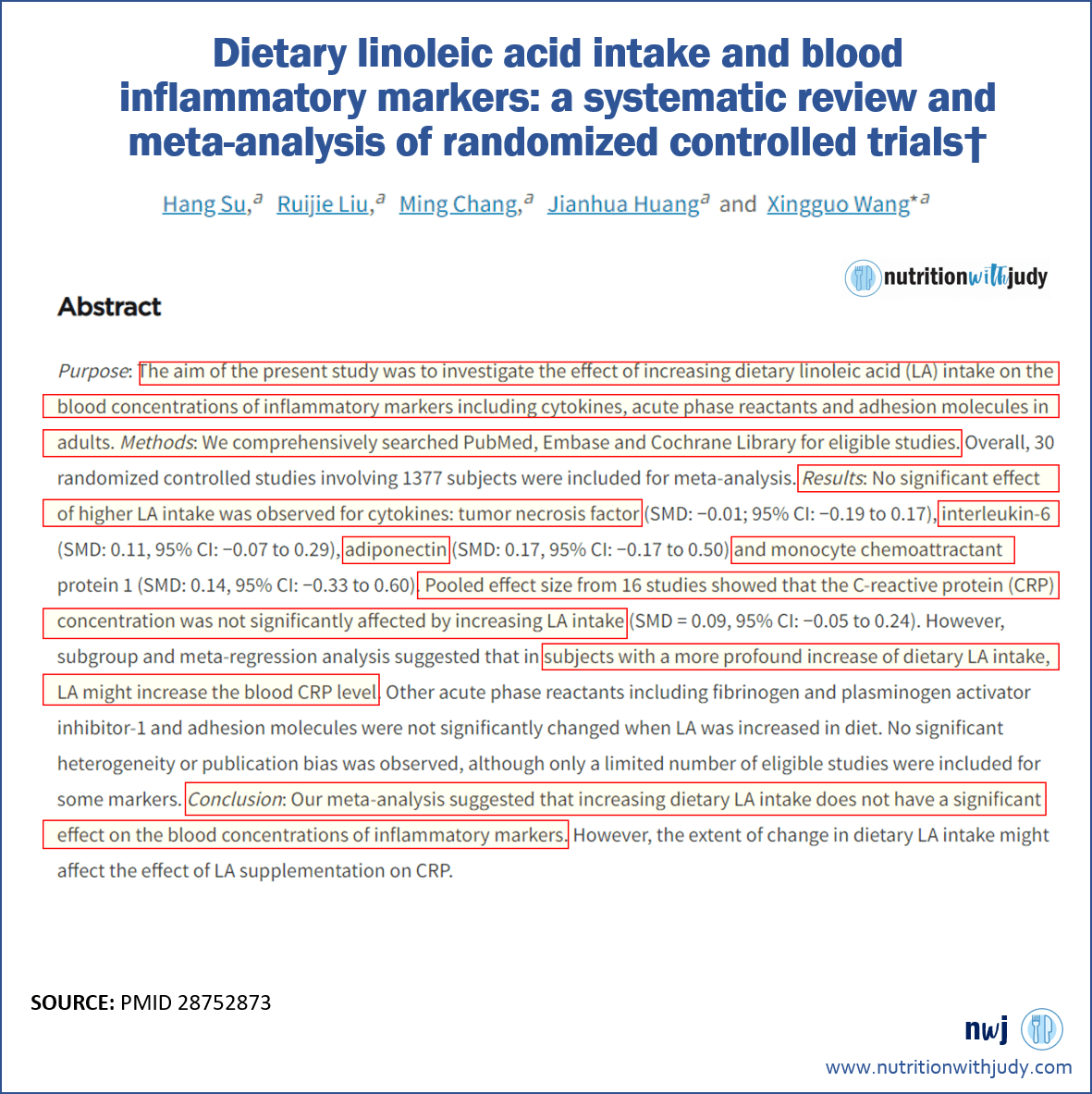
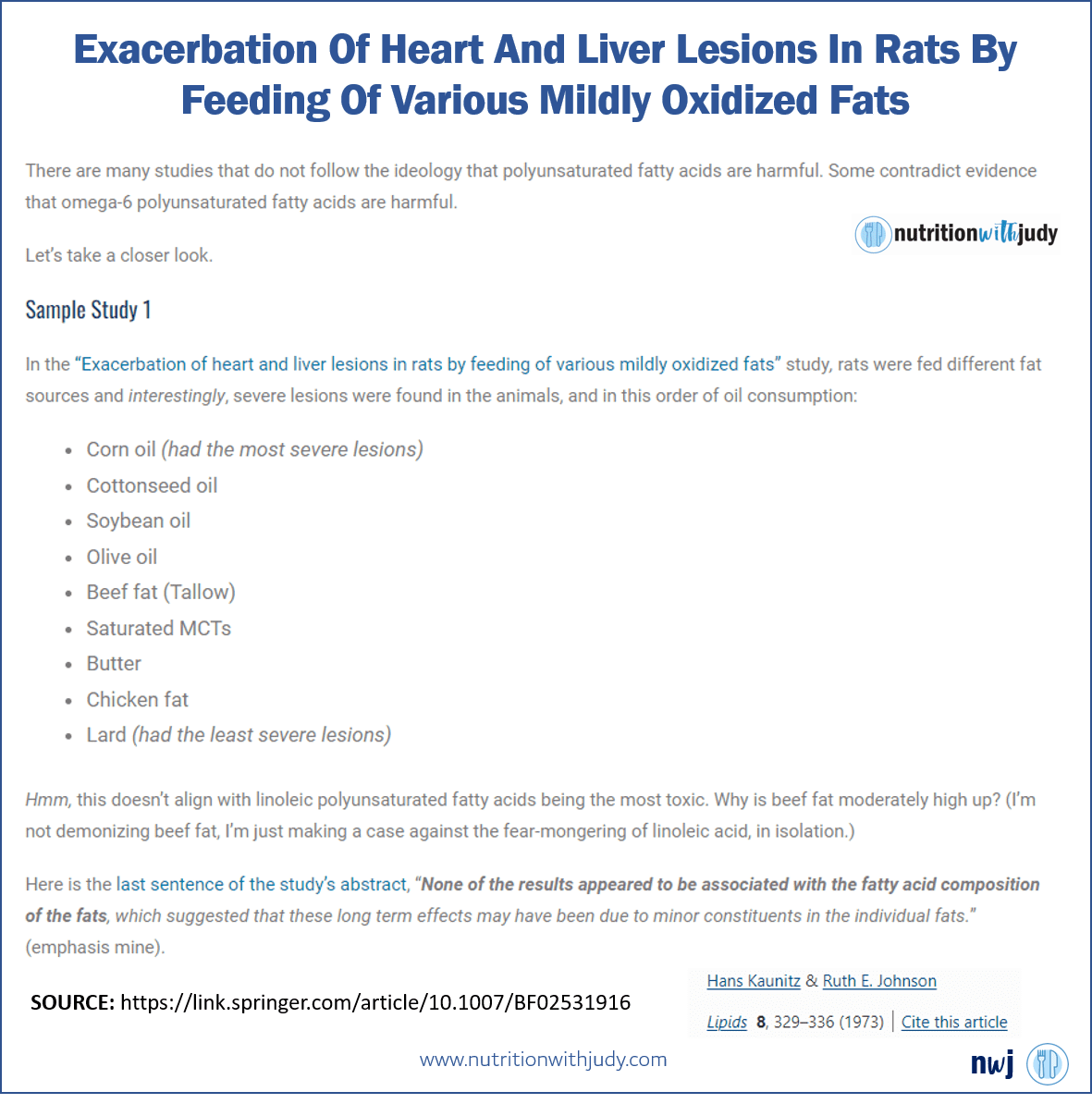
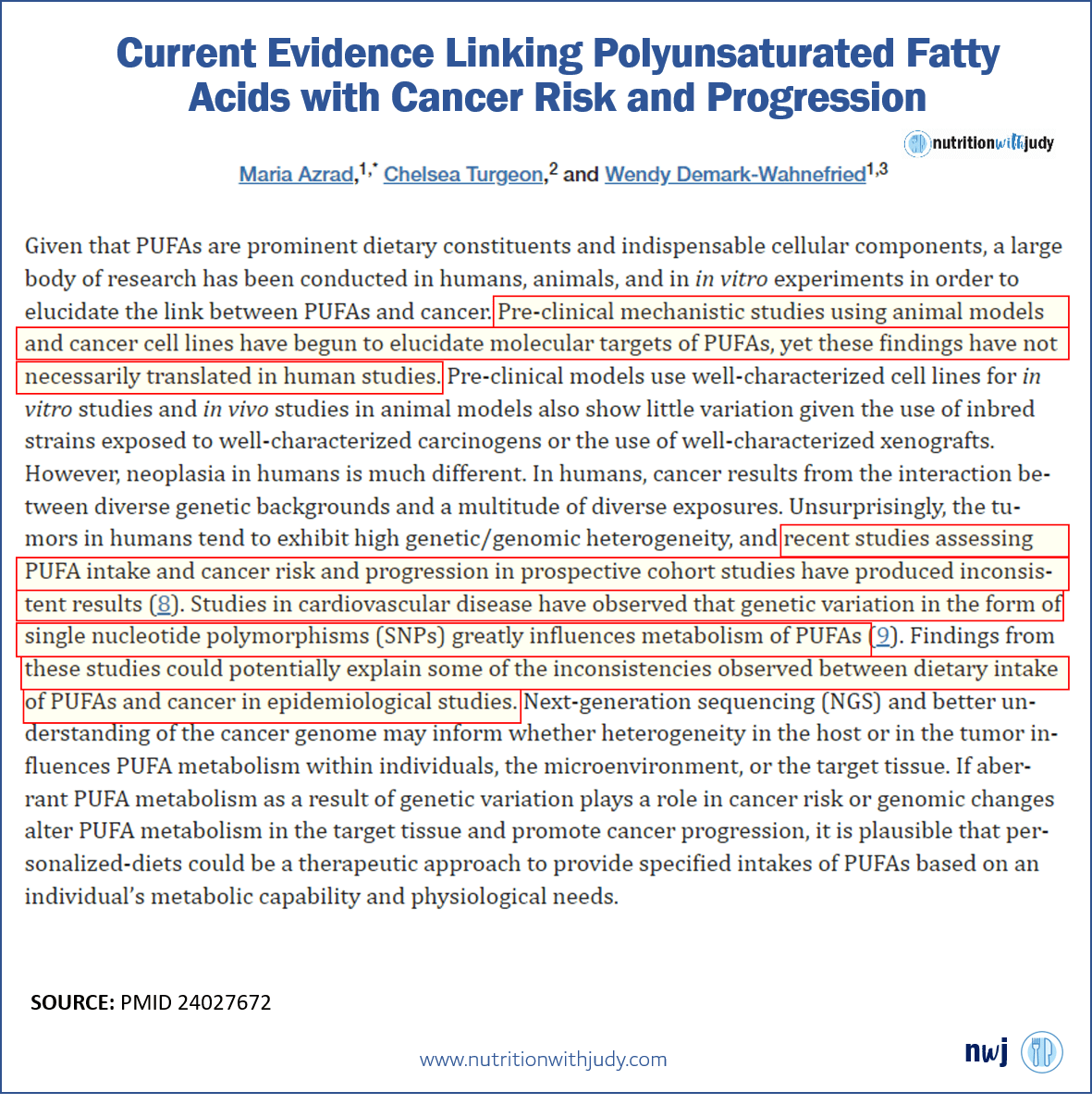
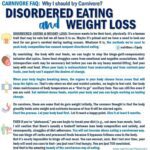

Debbie
December 3, 2020 at 10:39 pmHi Judy,
This article was so interesting and informative!! My husband and I recently switched to carnivore from a paleoish diet. We have a 3.5 year old who still is eating paleoish. She does have food sensitivities and has struggled with a weak immune system. How do you recommend one addresses a healthy style of eating for a child?
Judy
December 4, 2020 at 1:00 amThere’s a young child’s nutrient dense guide in the Carnivore Cure bonuses. https://www.nutritionwithjudy.com/shopping/guides/carnivore-cure-bonus-bundle/
Herpezine
December 11, 2020 at 2:48 amKnowing this information will help you a lot in your diet. You could help the community to expand their life span. Thank you very much!
Jess
January 7, 2021 at 10:18 pmThis was decent but I agree with what you said in the beginning of your post, you really only scratched the surface of Ray Peats work. He also references Dr Broda Barnes work, Dr Katharina Dalton, and Hans Selye. There is more for you to research on estrogen, thyroid, PUFA, iron overload, magnesium (and minerals in general), gut health, and the metabolism. I also recommend the work of Morley Robbins. I was paleoish for over a decade and have been incorporating many of Ray Peats principles for a year with success. Healing takes time though and can get worse before it gets better. Sugar and caffeine boost the metabolism… Which a fast metabolism requires more fuel/nutrients. It’s not necessarily that those things are depleting. A slowed metabolism doesn’t require as much fuel because it’s quite literally in conservation mode. Peat and Barnes also discuss low pulse and low body temp as low metabolic markers. They also talk about blood sugar balance c/p/f at each meal/snack as only protein lowers blood sugar (a stress) and carb can spike it. Together, they create balance. Caffeine should never be on an empty stomach as it’s flooring the gas pedal with no fuel in the tank. Stressful. Coffee is always after a meal and with plenty of cream, sugar, and often collagen. Peat also discusses serotonin and how it’s not the happy hormone… Often causing gut and nervous system issues. Anyway, I realize your bias and appreciate your analysis but I do think it requires a much deeper dive.
Nutrition with Judy
January 24, 2021 at 3:52 pmHi Jess. Thanks for writing and sharing your POV. I don’t question anecdotal stories and so if the way RP recommends eating has worked for you, I’m genuinely happy for you. I’m not really for diet dogma but finding what works for you to feel well. Most of my clients have found healing on a meat-based, very limited carb diet and I share all my opinions on fructose and other sugars on the body in my book. I don’t agree with RP on caffeine + sugar or serotonin and that’s okay.
Mike
February 15, 2021 at 9:01 pmHi Jess and Judy,
Interesting post and comment. I’ve read a little RP here/there over the years and always been curiously skeptical. As Judy mentions, RP himself doesn’t really put out official dietary guidelines to be followed, so it’s all in the interpretation. Jess, could you share what aspects of RP you think helped you or how you implemented it? I’ve tried vlc at times but the simple fact is I feel better with *a little bit* of cho; been playing lately with keeping it around 40-60g/day. I’m fighting chronic illness which my func doc believes to be systemic candida. Low energy, low T3/high TSH, cold, brain fog, chemically sensitive, dx’d with CFS at one point, gut issues, tired after eating. Many say no cho for candida, some say it can feed off ketones as well. Hard to know who to listen to. Definitely believe in quality animal foods for protein and fat, but with veggies or without? Hard to listen to Terry Wahls’s story and not believe her that the veggies have helped her. In my own life there’ve been times veggies seemed to really help, and others when they’ve definitely blown up my gut. Judy, what are your thoughts on The Perfect Health Diet, by the Jaminets? Their approach seems to have a bit of overlap with RP, and they (the Jaminets/suppose RP as well) are both highly intelligent and provide a lot of research/references. And claim to have healed their own chronic health issues. While we’re at it, might as well throw out The Zone and The Schwarzbein Diet, they all more or less argue for a balanced diet that is moderate in macros. Appreciate any and all comments / feedback from both of you!
Thanks,
Mike
Nutrition with Judy
February 15, 2021 at 9:03 pmHi Mike,
I’m not familiar with the Jaminets but if you find it to work for you, then it may what your body needs. I have my POV in Carnivore Cure and that’s really what I recommend everyone to start with as a baseline for healing. Then you can incorporate as needed. But I do not believe carbohydrates are required for optimal health. For metabolic flexibility and variety? Sure, but not required.
James IV
August 22, 2021 at 7:51 amI used to think the same way you do, about almost everything you wrote here. But after years of experience and working with others, I know now that removing carbs from your diet will only relive symptoms, it doesn’t cure them. Overtime, avoiding carbs will lead to all these issues you are trying to avoid. It may take years, but it will happen.
And once you get sick from carbohydrate avoidance, it’s incredibly difficult to heal as proper carbohydrate metabolism is essential for cellular regeneration. And it can take years to regain a proper oxidative metabolism.
I would never tell anyone what to put into their bodies. But I caution that a person should look deeply into human metabolism before removing carbohydrate from their diet.
Brad
March 2, 2022 at 3:00 amTotally agree James, I’ve done the sugar carb restricted diets and it was the most miserable time of my life , it took years of reintroducing sugars back into my diet to feel normal again , including warming the body with a healthier thyroid!
Jay
July 26, 2022 at 5:28 pmSpot on
Lisa Truitt
July 8, 2023 at 1:10 pmI used to think what you are saying. I tried low carb, had problems and then added back in carbs and it seemed to help some of the problems: sleep, stress, warmth, thyroid function maybe. But then I realized that I wasn’t eating enough meat and fat and all around calories when I did low carb and likely that was the problem. So I tried again with that in mind and that was it. It fixed the problem.
I think what’s actually going on with most people who think they need carbs is that they are grossly under eating. You can’t just eat to appetite. You have to count calories and what I’m finding is that I need almost 2 times the calories eating this way as when eating a more mixed diet with carbs. I’ve read a bunch of carnivore experts saying that the biggest mistake they see is under eating and now I believe it.
What you say about about feeling like your metabolism dropped is a big hint. That’s how I felt and do feel if I under eat.
Teya Skae
April 22, 2023 at 10:00 pmJudy now that you are doing hair mineral analysis if you do it justice without carnivore for all bias, you will come across many people who are Slow Oxidisers. These are typically miserable on a high fat moderate Meat diet. I have been doing HTMA with my clients since 2013 & have proof we are Biochemically Unique. Protein type, Carbo & Mixed. Why is this so hard for you & all the Carni people to acceot? Look at Dr Saladino. Classic example & he also wrote the carnivore diet book as well now he is thriving on fruits, honey & raw dairy. Why?He is not a classic protein type. As a scientist you are still promoting biases. Invite me on your show so we can debate this further. I have done Ray Peat, Carnivore, low carb, zero carb, raw primal & now I follow my hair mineral analysis. In addition, we can talk about the Liver Reams Biological theory of ionisation. Not many people do. Reams had 6 PhD’a 3 in chemistry 3 in maths. Reason t3 is low on carnivore is Liver requires some carb for detox & conversion of T4 to T3. If you really understand hair mineral analys, you would know blood tests are unreliable for adrenal or thyroid status. In Wellness!
Lisa Truitt
July 8, 2023 at 1:20 pmOr, like she said, maybe the reference ranges are not reliable.
I don’t buy hair mineral analysis anymore. At least not used the way you are talking about. Who is it that promotes that method of using it, Larry Wilson is that his name? It’s been awhile and I’m not sure if remember right. I tried that. Not impressed. I’m a supposed slow oxidizer and I do great on carnivore as long as I eat enough. However I don’t really count macros. I eat as much fatty meat as I need. When I try to limit protein and eat higher fat that doesn’t feel good. Feel hungry and not nourished,
I’m sorry but I think the hair mineral analysis as preached by Larry Wilson (who learned it from some other guy whose name I don’t remember) is pseudoscience as is the other stuff you listed. There is so much of that crap in alternative medicine.
Shelene Costello
July 22, 2023 at 12:19 pmThank you Judy! I’ve seen Dr Mercola’s recommendations and have been totally floored and frankly quite confused, as to why he would jump back on the bandwagon for basically what is the standard american diet with pushing a bunch of carbs again.
This helped me a whole lot to clear up a lot of confusion I’ve had.
I’m learning so much from your writings and your videos and I so appreciate your doing this.
Nathan Hoffner
August 23, 2023 at 7:03 amMuscles prefer to burn fat at rest, but in general, the body, especially the brain, and all of the cells prefer glucose for fuel. To think cells prefer an energy substrate (ketones and/or fat) which shows up in times of stress and starvation (which is a stress) is not thinking very logically. Glucose signals that things are good and the body can be in a health state. In a stress state, fatty acids are liberated, stress hormones are increased, and the disease process can begin if this stress state is not put brought back to homeostasis.
Jacob Cochrane
September 9, 2023 at 10:59 amI appreciate this article. I believe Judy has found success for herself and others using the carnivore approach. I also believe Ray Peat found a dietary approach that worked for him, and others have found success by applying his ideas. So there’s merit in both approaches. I’ll admit, I wish Judy had done a better job standing up the general RP approach before taking it apart. As someone curious, this article did not satisfy me. I’ve been doing high fat, animal-based for a few years (mostly). I feel great, but I also have concerns about establishing carb intolerance. Sheesh maybe only because I want to eat pie at Thanksgiving and such. Without getting into details, I think the best response to the “RP diet” is that many carnivorous species exist in nature. They don’t seem stressed by default, and it doesn’t appear that “cortisol is shredding their muscles.” That last idea, and the issue of whether certain organs “prefer” glucose or not – I think those need to be fleshed out much better, and not by a jerk like Bart Kay 🙂
Jen Pearly
December 20, 2023 at 5:43 amAll I know is that if nutrition is a science, it is still in the Dark Ages. Two medical providers urged me onto a Ray Peat eating style at once. After a year of eating that way, all my nonoptimal or poor labs became optimal. This included blood sugar, cholesterol, triglycerides, and all inflammation markers for the first time in my 60 years of life. I have EDS, a chronic pain condition, and my pain drastically decreased. So, at any rate, the experiment I ran on my particular body confirms the Ray Peat hypotheses/theories.
Nutrition with Judy
December 21, 2023 at 1:19 pmI always believe in trusting your own n=1 and body. If you feel better, then I support you.
Sarah Negus
March 22, 2024 at 10:48 amI’ve followed a Peat “type” diet for years. LOW low fat, low animal protein.. My energy, weight and health improved big time with HIGH FRUIT!!! Fructose from natural fruit can NEVER be wrong. I’m Irish (2nd gen here in US) Grew up with ALOT of meat/eggs/fish.. had CRONIC health problems including severe constipation most of my life, until I recognized that fruit (including avacado) totally cured me!!! If I had to kill a cow or chicken or pig.. I would NEVER have an appetite for their flesh. We do not have the intestinal mileau/environment to process cooked animal flesh..nor do we have high enough levels of HCL in our saliva and stomach.. Can some people “handle” more cooked or raw animal flesh…Maybe, not sure. It just makes no sense to me that human beings are canivore by design…without major tools to kill the animal (special knives, hooks to hang cows etc) and process and discard the carcasss…Well I couldn’t do it, nor would want to….the milk is also weird to me but I could wrap brain around that before the flesh….